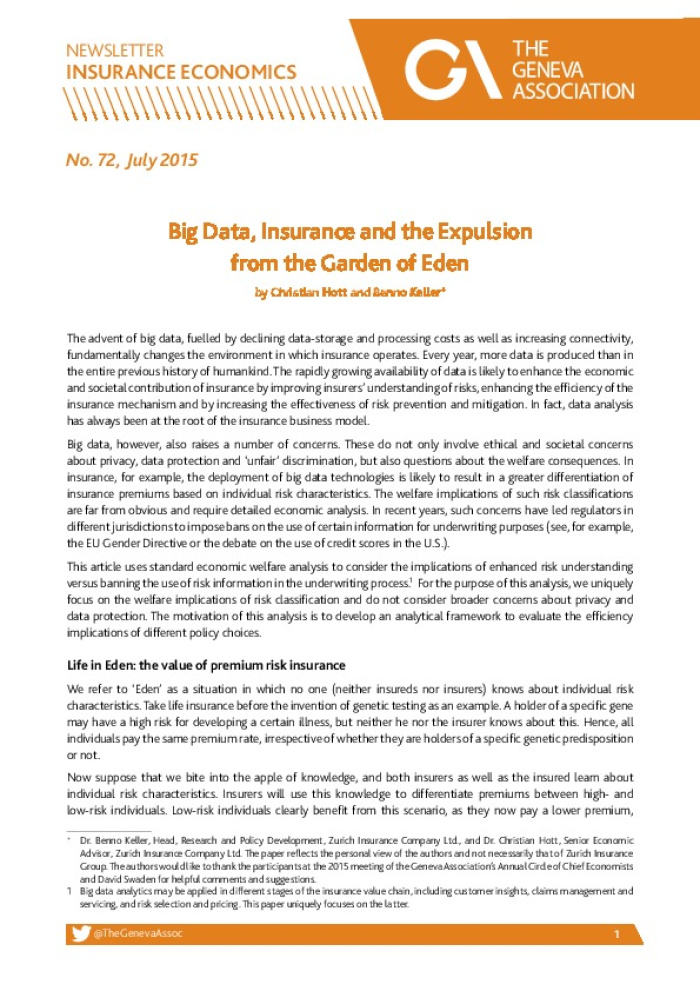Big Data, Insurance and the Expulsion from the Garden of Eden
Article from Insurance Economics Newsletter No. 72

1 FINANCIAL SBILITY AT ION NEWSLETTER INSURANCE ECONOMICS Big Data, Insurance and the Expulsion from the Garden of Eden by Christian Hott and Benno Keller+ The advent of big data, fuelled by declining data-storage and processing costs as well as increasing connectivity, fundamentally changes the environment in which insurance operates. Every year, more data is produced than in the entire previous history of humankind. The rapidly growing availability of data is likely to enhance the economic and societal contribution of insurance by improving insurers? understanding of risks, enhancing the efficiency of the insurance mechanism and by increasing the effectiveness of risk prevention and mitigation. In fact, data analysis has always been at the root of the insurance business model. Big data, however, also raises a number of concerns. These do not only involve ethical and societal concerns about privacy, data protection and ?unfair? discrimination, but also questions about the welfare consequences. In insurance, for example, the deployment of big data technologies is likely to result in a greater differentiation of insurance premiums based on individual risk characteristics. The welfare implications of such risk classifications are far from obvious and require detailed economic analysis. In recent years, such concerns have led regulators in different jurisdictions to impose bans on the use of certain information for underwriting purposes (see, for example, the EU Gender Directive or the debate on the use of credit scores in the U.S.). This article uses standard economic welfare analysis to consider the implications of enhanced risk understanding versus banning the use of risk information in the underwriting process. 1 For the purpose of this analysis, we uniquely focus on the welfare implications of risk classification and do not consider broader concerns about privacy and data protection. The motivation of this analysis is to develop an analytical framework to evaluate the efficiency implications of different policy choices. Life in Eden: the value of premium risk insurance We refer to ?Eden? as a situation in which no one (neither insureds nor insurers) knows about individual risk characteristics. Take life insurance before the invention of genetic testing as an example. A holder of a specific gene may have a high risk for developing a certain illness, but neither he nor the insurer knows about this. Hence, all individuals pay the same premium rate, irrespective of whether they are holders of a specific genetic predisposition or not. Now suppose that we bite into the apple of knowledge, and both insurers as well as the insured learn about individual risk characteristics. Insurers will use this knowledge to differentiate premiums between high- and low-risk individuals. Low-risk individuals clearly benefit from this scenario, as they now pay a lower premium, + Dr. Benno Keller, Head, Research and Policy Development, Zurich Insurance Company Ltd., and Dr. Christian Hott, Senior Economic Advisor, Zurich Insurance Company Ltd. The paper reflects the personal view of the authors and not necessarily that of Zurich Insurance Group. The authors would like to thank the participants at the 2015 meeting of the Geneva Association?s Annual Circle of Chief Economists and David Swaden for helpful comments and suggestions. 1 Big data analytics may be applied in different stages of the insurance value chain, including customer insights, claims management and servicing, and risk selection and pricing. This paper uniquely focuses on the latter. No. 72, July 2015 @TheGenevaAssoc INSURANCE ECONOMICS